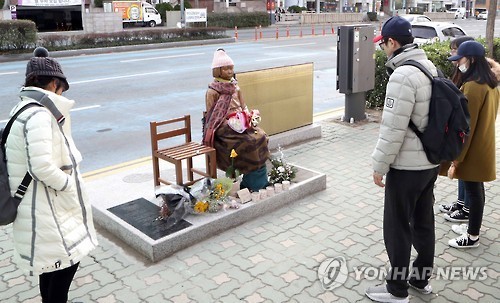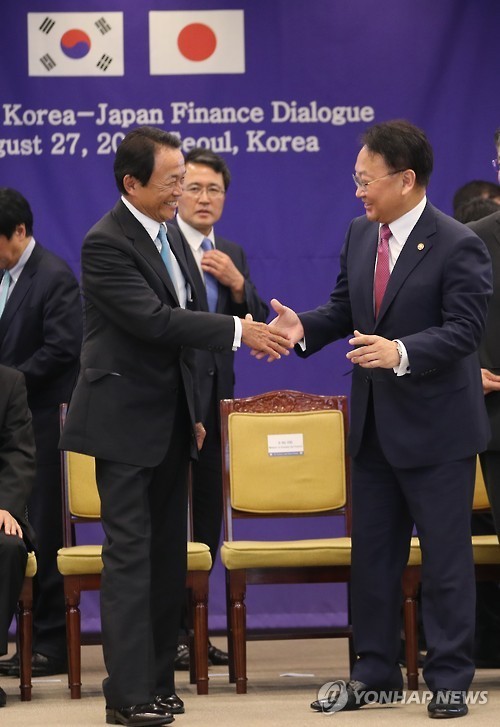Japan’s decision to suspend talks on a currency swap last Friday will have limited impact while caution is still advised, according to economists and experts.
Song In-chang, deputy finance minister, played down a possible repercussion of the suspension of the bilateral currency swap deal, saying that “It wouldn’t have much impact as it is not like an existing program ended.”
Sung Tae-yun, economics professor at Yonsei University said, “It is very unlikely that there would be an exodus of dollars from the domestic market and make the foreign exchange market unstable.”
Other experts also pointed out that a currency swap with Japan is not vital considering South Korea’s ample foreign reserve and other swap deals with countries like China and Malaysia.
 |
South Koreans visit a "comfort women" statue in front of the Japanese Consulate General building in the southern port city of Busan on Jan. 7, 2017. (Yonhap) |
They also noted that the negotiation had already been predicted to be difficult considering the deal having been politically influenced in the past. .
The previous currency swap deal expired on February 2015 after 14 years of operation amid chilly bilateral relations over historical and territorial issues.
Some, meanwhile, also said that extra swap programs would still be a safety net for Korea as it enables each nation to secure dollars from the other in exchange for their own currency during financial emergencies.
“Putting aside political agendas, a currency swap between Korea and Japan is economically beneficial, ”Rye Keun-kwan, economics professor at Seoul National University, had said in previous news reports. “Therefore, it is not right if the deal is suspended due to political reasons.”
But while recognizing benefits of a swap deal, Chang Jae-chul, an economist at Citibank Korea Inc. said that additional swap deals are not vital right now considering the country’s ample foreign currency reserves and improve external balances since the global financial crisis.
Korea’s foreign-exchange holdings stood at $371 billion as of the end of December, according to the Bank of Korea data.
 |
South Korea`s Finance Minister Yoo Il-ho (R) shakes hands with his Japanese counterpart Taro Aso at the Korea-Japan finance ministers meeting in Seoul on Aug. 27, 2016. (Yonhap file photo) |
Japan on Friday announced that it was withdrawing from the talks on the Korea-Japan currency swap citing Korea’s decision to let a statute symbolizing the victims of Japan’s wartime sexual slavery be built in front of its consulate building in the southern port city of Busan.
Korea had proposed to resume negotiation on the swap deal with Japan, the world’s second-largest foreign currencies holder, on a foreign-exchange reserve of more than $1.2 trillion. The two nations reopened negotiations in August.
South Korea has swap deals with United Arab Emirates, Malaysia, Australia and Indonesia. It is also part of the multilateral currency swap deal called Chiang Mai Initiative, an emergency dollar liquidity facility created after the 1997 Asian currency crisis among South Korea, China, Japan and the Association of Southeast Asian Nations. The countries will discuss the expansion of the CMI in May in an attempt to prevent another currency crisis.
However, South Korea needs to strengthen its readiness for turbulence in global markets nonetheless, market watchers said, and authorities vowed to stabilize foreign exchange markets under the uncertainty over the new US administration and growing tension between South Korea and China.
The currency swap program between Korea and China worth $56 billion is set to expire in October. The two countries could face bumpy negotiations in renewing the swap deal amid political tension over Korea’s decision to station the US Terminal High Altitude Area Defense.
“If external risks actualize at the same time or are combined with worsening local conditions, the effect could be unexpectedly severe,” Bank Of Korea Governor Lee Ju-yeol had said at the end of last year. “Keeping stability in the financial and foreign exchange markets and the real economy are the indisputably top priority tasks.”
Amid strengthening dollars, many countries are trying hard to defend their currencies amid rising volatility and uncertainty in the markets. The foreign reserves around the world plunged by 10 percent when compared with the volume in July 2014 to $10.8 trillion as of Friday according to data compiled by Bloomberg. The foreign reserves had increased after the financial crisis in 2008 and 2009 until it began to decline in mid-2014.
Leading the trend is China, the largest foreign currency holder. The foreign reserve of the world’s second-largest economy dropped by $41.08 billion to $3.15 trillion as of Dec. 31, 2016, or a 25 percent plunge compared with June 2014, according to the People’s Bank of China on Saturday. The People’s Bank of China said efforts to stabilize its currency are the main reason for the drop in the foreign reserves.
With a currency swap measure out of the picture, “South Korea needs to strive to increase foreign reserve while avoiding to be labeled as a currency manipulator by the US in order to avoid any external impact triggered by the US interest hikes,” Jeong Young-sik, head of international finance team at the Korea Institute for International Economic Policy, said.
By Park Ga-young (
gypark@heraldcorp.com)








![[Today’s K-pop] Blackpink’s Jennie, Lisa invited to Coachella as solo acts](http://res.heraldm.com/phpwas/restmb_idxmake.php?idx=644&simg=/content/image/2024/11/21/20241121050099_0.jpg)
